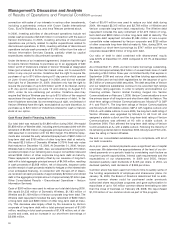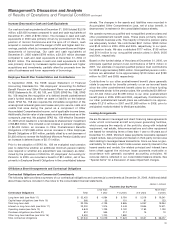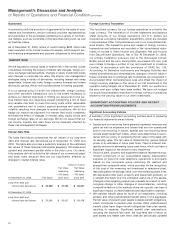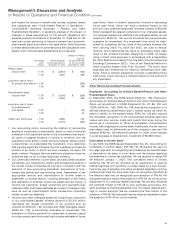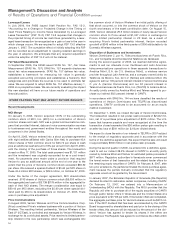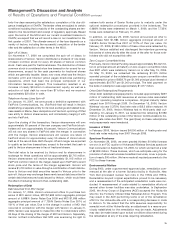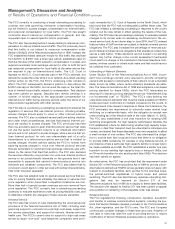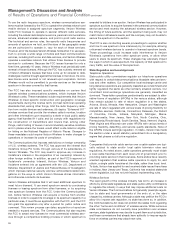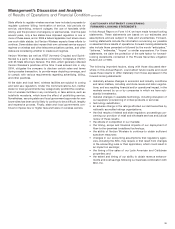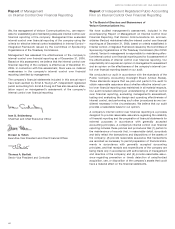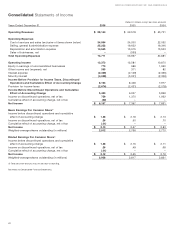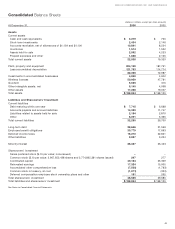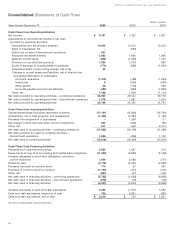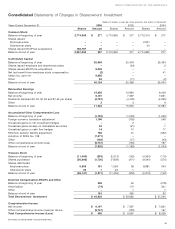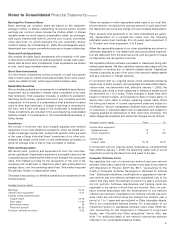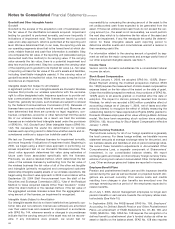Verizon Wireless 2006 Annual Report Download - page 40
Download and view the complete annual report
Please find page 40 of the 2006 Verizon Wireless annual report below. You can navigate through the pages in the report by either clicking on the pages listed below, or by using the keyword search tool below to find specific information within the annual report.
38
Management’s Discussion and Analysis
of Results of Operations and Financial Condition continued
To use the radio frequency spectrum, wireless communications sys-
tems must be licensed by the FCC to operate the wireless network and
mobile devices in assigned spectrum segments. Verizon Wireless
holds FCC licenses to operate in several different radio services,
including the cellular radiotelephone service, personal communications
service, advanced wireless service, and point-to-point radio service.
The technical and service rules, the specific radio frequencies and
amounts of spectrum we hold, and the sizes of the geographic areas
we are authorized to operate in, vary for each of these services.
However, all of the licenses Verizon Wireless holds allow it to use spec-
trum to provide a wide range of mobile and fixed communications
services, including both voice and data services, and Verizon Wireless
operates a seamless network that utilizes those licenses to provide
services to customers. Because the FCC issues licenses for only a
fixed time, generally 10 years, Verizon Wireless must periodically seek
renewal of those licenses. Although the FCC has routinely renewed all
of Verizon Wireless’s licenses that have come up for renewal to date,
challenges could be brought against the licenses in the future. If a wire-
less license were revoked or not renewed upon expiration, Verizon
Wireless would not be permitted to provide services on the licensed
spectrum in the area covered by that license.
The FCC has also imposed specific mandates on carriers that
operate wireless communications systems, which increase Verizon
Wireless’s costs. These mandates include requirements that Verizon
Wireless: (i) meet specific construction and geographic coverage
requirements during the license term; (ii) meet technical operating
standards that, among other things, limit the radio frequency radia-
tion from mobile devices and antennas; (iii) deploy “Enhanced 911”
wireless services that provide the wireless caller’s number, location
and other information upon request by a state or local public safety
agency that handles 911 calls; and (iv) comply with regulations for
the construction of transmitters and towers that, among other
things, restrict siting of towers in environmentally sensitive locations
and in places where the towers would affect a site listed or eligible
for listing on the National Register of Historic Places. Changes to
these mandates could require Verizon Wireless to make changes to
operations or increase its costs of compliance.
The Communications Act imposes restrictions on foreign ownership
of U.S. wireless systems. The FCC has approved the interest that
Vodafone Group Plc holds, through various of its subsidiaries, in
Verizon Wireless. The FCC may need to approve any increase in
Vodafone’s interest or the acquisition of an ownership interest by
other foreign entities. In addition, as part of the FCC’s approval of
Vodafone’s ownership interest, Verizon Wireless, Verizon and
Vodafone entered into an agreement with the U.S. Department of
Defense, Department of Justice and Federal Bureau of Investigation
which imposes national security and law enforcement-related obli-
gations on the ways in which Verizon Wireless stores information
and otherwise conducts its business.
Verizon Wireless anticipates that it will need additional spectrum to
meet future demand. It can meet spectrum needs by purchasing
licenses or leasing spectrum from other licensees, or by acquiring
new spectrum licenses from the FCC. Under the Communications
Act, before Verizon Wireless can acquire a license from another
licensee in order to expand its coverage or its spectrum capacity in a
particular area, it must file an application with the FCC, and the FCC
can grant the application only after a period for public notice and
comment. This review process can delay acquisition of spectrum
needed to expand services. The Communications Act also requires
the FCC to award new licenses for most commercial wireless serv-
ices through a competitive bidding process in which spectrum is
awarded to bidders in an auction. Verizon Wireless has participated in
spectrum auctions to acquire licenses in the personal communication
service and most recently the advanced wireless service. However,
the timing of future auctions, and the spectrum being sold, may not
match Verizon Wireless’s needs, and the company may not be able to
secure the spectrum in the auction.
The FCC is also conducting several proceedings to explore whether
and how to use spectrum more intensively by, for example, allowing
unlicensed wireless devices to operate in licensed spectrum bands.
These proceedings could increase radio interference to Verizon
Wireless’s operations from other spectrum users, or allow other
users to share its spectrum. These changes may adversely impact
the ways in which it uses spectrum, the capacity of that spectrum to
carry traffic, and the value of that spectrum.
State Regulation and Local Approvals
Telephone Operations
State public utility commissions regulate our telephone operations
with respect to certain telecommunications intrastate rates and serv-
ices and other matters. Our competitive local exchange carrier and
long distance operations are generally classified as nondominant and
lightly regulated the same as other similarly situated carriers. Our
incumbent local exchange operations are generally classified as
dominant. These latter operations predominantly are subject to alter-
native forms of regulation (AFORs) in the various states, although
they remain subject to rate of return regulation in a few states.
Arizona, Illinois, Nevada, New Hampshire, Oregon and Washington
are rate of return regulated with various levels of pricing flexibility for
competitive services. California, Connecticut, Delaware, the District
of Columbia, Florida, Indiana, Maryland, Michigan, Maine,
Massachusetts, New Jersey, New York, North Carolina, Ohio,
Pennsylvania, Rhode Island, South Carolina, Texas, Vermont, Virginia,
West Virginia and Wisconsin are under AFORs with various levels of
pricing flexibility, detariffing, and service quality standards. None of
the AFORs include earnings regulation. In Idaho, Verizon has made
the election under a recent statutory amendment into a deregulatory
regime that phases out all price regulation.
Video
Companies that provide cable service over a cable system are typi-
cally subject to state and/or local cable television rules and
regulations. As noted above, cable operators generally must obtain
a local cable franchise from each local unit of government prior to
providing cable service in that local area. Some states have recently
enacted legislation that enables cable operators to apply for, and
obtain, a single cable franchise at the state, rather than local, level.
To date, Verizon has applied for and received state-issued franchises
in Indiana, New Jersey and Texas. California has enacted statewide
reform legislation, but has not yet finalized implementing rules.
Wireless Services
The rapid growth of the wireless industry has led to an increase in
efforts by some state legislatures and state public utility commissions
to regulate the industry in ways that may impose additional costs on
Verizon Wireless. The Communications Act generally preempts regula-
tion by state and local governments of the entry of, or the rates
charged by, wireless carriers. Although a state may petition the FCC to
allow it to impose rate regulation, no state has done so. In addition,
the Communications Act does not prohibit the states from regulating
the other “terms and conditions” of wireless service. While numerous
state commissions do not currently have jurisdiction over wireless
services, state legislatures may decide to grant them such jurisdiction,
and those commissions that already have authority to impose regula-
tions on wireless carriers may adopt new rules.




